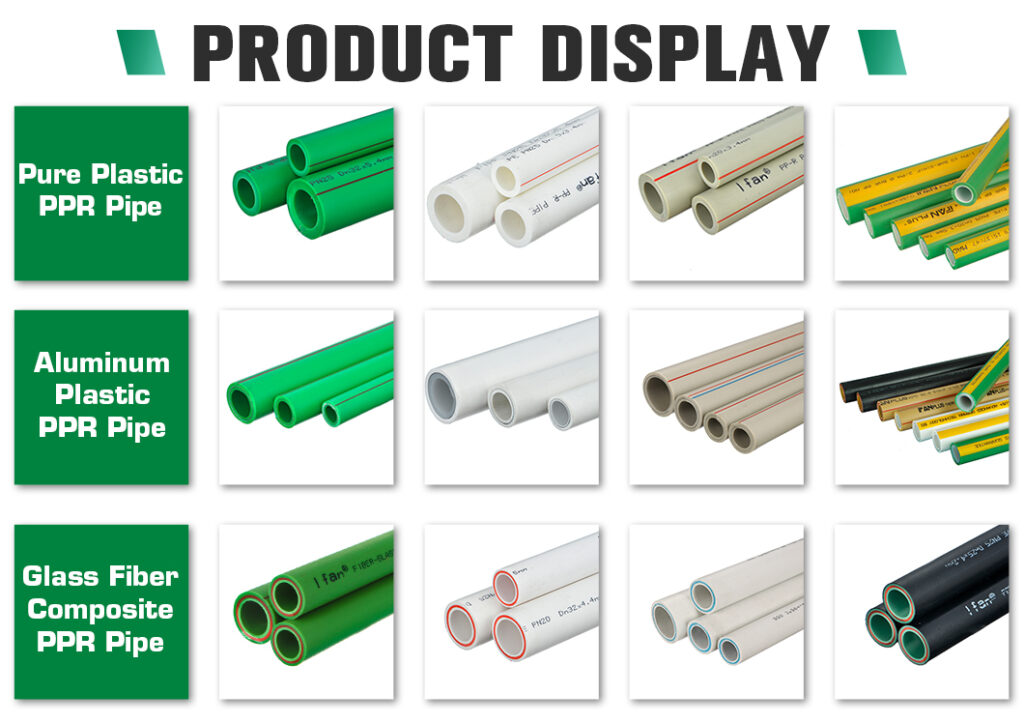The Versatility and Benefits of PPR Pipes in Modern Industry.Polypropylene Random Copolymer (PPR) pipes, a type of thermoplastic piping system, have gained widespread recognition and use in modern industries. Their unique properties, ease of installation, and compatibility with a variety of applications make them a preferred choice. In this guide, we will explore the versatility and benefits of PPR pipes in contemporary industry.IFAN factory 30+ years manufacture experience support color/size customization support free sample.Welcome to consult for catalog and free samples.This is our FacebookWebsite: www.facebook.com.
Understanding PPR Pipes
PPR pipes are made from Polypropylene Random Copolymer, a high-quality thermoplastic material known for its excellent mechanical properties. They consist of three layers:
Outer Layer: This layer provides protection against environmental factors, ensuring the pipe’s durability over time.
Middle Layer: The middle layer serves as a reinforcing structure, contributing to the pipe’s strength and stability.
Inner Layer: The innermost layer is designed to maintain the quality of the transported fluids, preventing contamination.
Versatility and Benefits
PPR pipes offer several unique benefits, making them a versatile choice across multiple industries:
Corrosion Resistance: PPR pipes are inherently corrosion-resistant, which is a crucial advantage, especially when transporting liquids that may be chemically reactive.
High Strength: These pipes exhibit remarkable strength and are capable of withstanding significant pressure, making them suitable for various applications.
Thermal Stability: PPR pipes maintain their structural integrity even at high temperatures, making them ideal for hot water supply systems.
Low Maintenance: Their durability and longevity contribute to minimal maintenance costs, a significant benefit for industrial and residential applications alike.
Hygienic Properties: PPR pipes do not corrode or leach substances into the transported fluids, ensuring the cleanliness and safety of the conveyed substances.

Applications Across Industries
PPR pipes are widely employed in diverse industrial sectors:
1. Residential Construction
In residential settings, PPR pipes are commonly used for both hot and cold water supply systems. Their ease of installation, durability, and hygienic characteristics make them a preferred choice for homeowners.
2. Industrial Sector
In industries, PPR pipes find applications in chemical transport, compressed air systems, and industrial water supply. Their corrosion resistance and robustness are valuable assets in these settings.
3. Agriculture and Horticulture
PPR pipes are utilized in agricultural irrigation systems and greenhouse setups, ensuring consistent and reliable water supply for crops and plants.
4. Swimming Pools and Spas
PPR pipes play a vital role in swimming pool and spa systems. Their resistance to chlorine and ability to withstand high temperatures ensure efficient water circulation and maintenance.
5. Infrastructure Development
In infrastructure projects, such as municipal water supply systems, wastewater treatment plants, and drainage systems, PPR pipes used for their durability and low maintenance requirements.
6. Renewable Energy Sector
PPR pipes are integral in renewable energy applications, such as solar water heating systems, due to their capacity to endure high temperatures.
7. Food and Beverage Industry
The food and beverage sector relies on PPR pipes for their hygienic attributes, ensuring the quality and safety of food and beverage products.
Installation and Maintenance
The proper installation and regular maintenance of PPR piping systems are vital for their efficient operation. This includes selecting the correct pipe diameter, maintaining appropriate temperature and pressure, and conducting regular inspections to identify and address any issues promptly.
Conclusion
The Versatility and Benefits of PPR Pipes in Modern Industry,PPR pipes have become indispensable in modern industry, offering an array of benefits, including corrosion resistance, strength, and thermal stability. Their versatility and hygienic properties make them a top choice for applications where the quality of transported fluids is of utmost importance. As technology continues to evolve, PPR pipes expected to play an even more significant role in our rapidly advancing industrial landscape.

